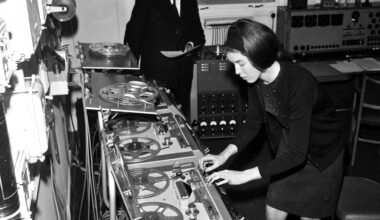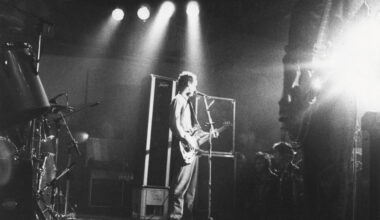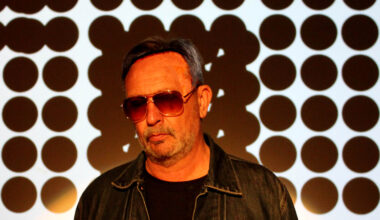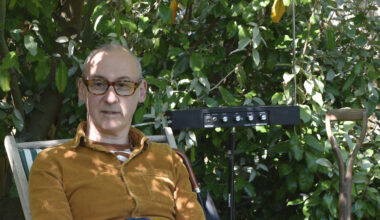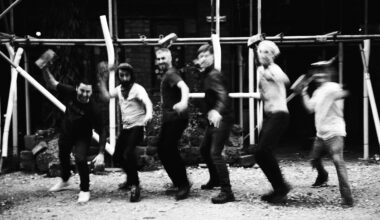From Detroit techno legend – a key member of Underground Resistance, no less – to Alabama church preacher, Robert Hood is a man on a mission. Now he’s teaming up with his daughter Lyric Hood under the name Floorplan and the result is wholly exhilarating
As an early member of Underground Resistance and the architect of a genre with 1994’s ‘Minimal Nation’, Robert Hood is one of the few techno producers who can genuinely be called an innovator. He’s a legendary DJ too, an incendiary sonic preacher, and has been leading mesmerised congregations to mass catharsis for over 25 years. But he’s long been aware that this kind of communal euphoria is simply a modern variation on the out-of-body abandonment that has gripped black gospel churches for centuries.
I once found myself in an East Harlem storefront church on a late 80s Sunday morning with a gospel service in full swing and I remember being hit by a wave of ecstatic energy that put New York’s Limelight club to shame, even the time I saw Robert Hood perform there with Underground Resistance. So it’s interesting to note the full-on gospel vibe of ‘Victorious’, the new album from Floorplan, Hood’s parallel house music project. But it won’t come as a surprise to those who know that, alongside his music career, he has been a church minister for many years.
Hood first started preaching at the New Order Missionary Baptist Church, right behind the Motown Museum in Detroit, his city of birth. His interest in the church took a giant leap 12 years ago, when he and his family relocated to Atmore, a farming community in deepest Alabama, to settle on land owned by his wife Eunice’s parents. It’s a far cry from Hood’s days as Detroit techno royalty, enjoying the superstar DJ lifestyle during his initial flush of success. Eunice’s grandfather built the house the family live in with his bare hands.
“We wanted the opportunity to start something new and fresh, so coming here just made sense,” says Hood. “The city boy in the country… it was a major change, to say the least! These days, I find myself doing some of the things that farmers do. After this interview, I’m going outside to cut a massive field on my tractor mower.”
When he made the move down, was he at all worried about Alabama’s reputation as a hotbed of racism?
“We didn’t know what to expect,” he replies. “We were taking a big step, of course, but we came with the mindset that everybody has their own personality. I don’t like how people generalise. When you watch television, you get these ideas of what rural Alabama is like, and it’s true that there are still racist attitudes, but a lot has changed since the 50s and 60s.
“The open spaces around Atmore have helped me to relax and to think differently, as opposed to having to deal with the hustle and bustle of city life. I felt that my education in Detroit had run its course, in terms of my church and my neighbourhood, so I needed to be taught something new. It was time to graduate from that school, time to get myself into another school, time to move out of my comfort zone.”
Bearing in mind his Christian faith, is the gospel vibe that surges through his Floorplan recordings pretty much inevitable?
“My gospel, jazz and blues roots have come full circle since moving to Alabama. My father was a jazz musician and my mother sang. Her uncle, who was the pastor in our church in Detroit, sang in a gospel quartet. So the influences I grew up with, like Aretha Franklin and Shirley Caesar, have stayed with me over the years. My grandmother played tambourine at the church and watching her kiss the Holy Ghost, and then feeling God’s presence take a hold and seeing how people interacted with that, those things all inspired me. When I came here, where there were once slaves and sharecroppers in these fields, I found that foot-stomping sound resonated with me even more strongly.”
Robert Hood released his first Floorplan 12-inch in 1996, but it wasn’t until 2013 that he brought out an album under this alias. It was worth the wait, though. ‘Paradise’ struck spiritual gold, not least because it included the massive, Aretha-sampling ‘Never Grow Old’. ‘Victorious’ picks up where ‘Paradise’ left off, presenting a series of fascinating alt-house workouts, many of them fuelled by a revivalist fervour.
‘Victorious’ is also notable for bringing Hood’s 19-year-old daughter Lyric into the Floorplan fold. Her teenage energy and musical tastes give an edge to tracks such as the hypnotic ‘Spin’, the gloriously disco-fied ‘Sun In The Sky’ and the warped jack of ’Good Thang’, the latter complete with a lowdown blues guitar.
“Lyric just evolved into this project,” says Hood, who has to apologise for his daughter’s absence on the day of our interview because she was at the hairdressers. “We’re playing some shows and she’s getting all glammed up so we can hit the road. She’s getting her Beyoncé on.”
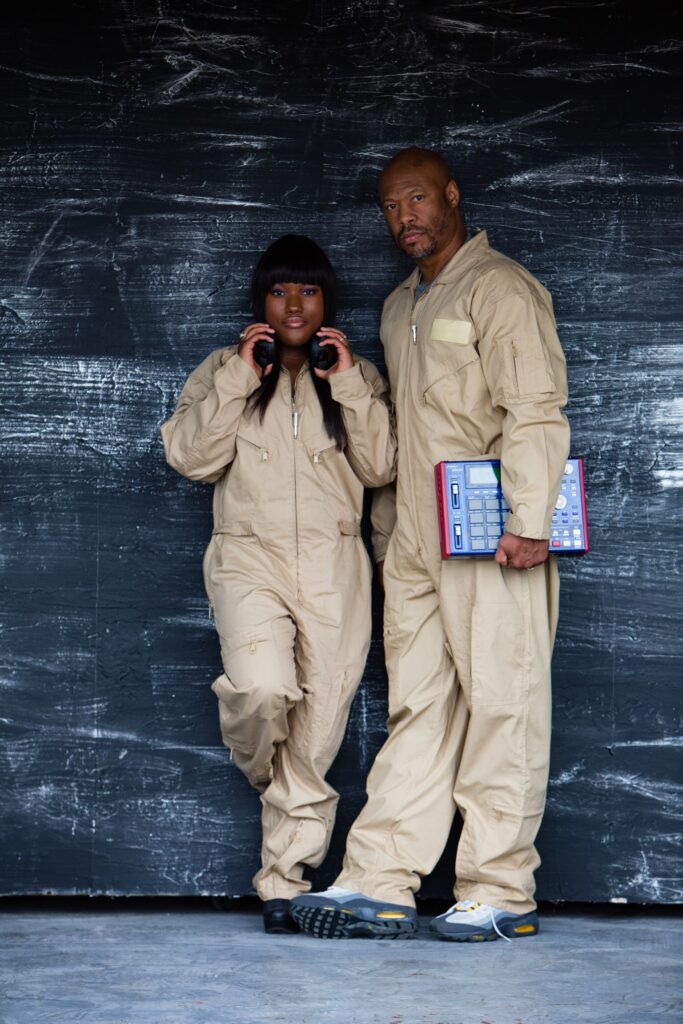
He recalls how Lyric started DJing after he’d invited her to play her favourite records at her 16th birthday party. The experience ignited the music bug in her.
“She did great. I liked what she played and the way she organised her mixes. Watching how she worked with her instincts and how she approached the music, I could see she knew what she wanted to hear. It was an eclectic mixture – Rob Base & DJ E-Z Rock, Notorious BIG, R Kelly, Katy Perry…”
“I was very nervous and excited,” Lyric tells me via email a couple of days later. “I had planned and prepped to do this months and months ahead of time and it actually turned out better than I thought it was going to. It was amazing.”
“Sure, I gave her some pointers,” laughs Hood. “A little while after that, she started DJing at our church. Every Sunday morning, she’d set up and DJ along with the choir. My wife and I are watching this unfold and eventually I said, ‘How about if she played with me?’. So when I did a live set at the Movement festival in Detroit in 2014, I had her come on and DJ. I let her do her own thing, adding some Martin Garrix and stuff that she liked. I didn’t question it, I said, ‘If that’s what you wanna do, go right ahead and do it’.”
“We did Movement again the following year and then I had the opportunity to tour with my dad in the summer of 2015,” says Lyric. “It was really exciting, really special. It was indescribable.”
“The next step was when my wife and I said, ‘How about if she becomes part of Floorplan?’,” continues Hood. “For me, Floorplan always felt like it should be a group effort, right from when I did the ‘Funky Souls’ 12-inch in 1996. And this was a perfect fit. My daughter and I have always had a very strong connection. She was born on Father’s Day and we’ve always bonded over music.”
So when it came to ‘Victorious’, how did father and daughter approach the studio process? Lyric says it involved them both working with MPCs.
“When we’re recording, I’ll usually start by searching for sounds in my music library. I’ll then tap out basslines and drum patterns on my MPC while my dad works on chords.”
“She’ll come to me with an idea, a bassline or a drum loop she has in her head, and that’s where we’ll start. She’s inspired by folks like Frankie Knuckles, Todd Terry and Ron Trent. She also likes the Fast Eddie-style jack house. Watching her getting into artists like that has helped me to rediscover all these brilliant house tracks, like the Frankie Knuckles remix of The Jackson 5’s ‘Forever Came Today’, and it’s interesting to watch how she’s taking old records apart and re-imagining them.
“It’s just a lot of fun working with my daughter. The ideas really often come together when we’re spending some time together in the car. She’ll say, ‘I like this Kendrick Lamar sample’ or ‘What do you think of this Missy Elliott track?’. We bounce thoughts back and forth between each other. And because she’s still a kid, she’s very honest. She’ll say, ‘That won’t work’. So I listen to what she’s playing and find myself making the sort of beats she’d like to hear. In a way, she has really shaped this album and projected a fresh perspective into it.”
“I like to listen to people like Ariana Grande and Drake, so I think I’ve shown dad a youthful approach to music,” says Lyric. “I think I’ve helped breathe new life into the Floorplan sound.”
With the clock running down on our interview, I ask Robert Hood if there was a pivotal moment when he decided to back away from the techno treadmill and start preaching in church.
“A prophecy was spoken into me,” he explains. “We had a visiting minister come to our church in Detroit and I was there working the sound that day. All of a sudden, the minister turns around and points to me and says, ‘You’re going to preach’. I didn’t think he could be talking to me because I just couldn’t see me getting involved in the ministry. After church, my wife said to me, ‘He prophesised over you… he saw something you don’t necessarily see’. I’m the last one to raise my hands in church and shout ‘Praise the Lord’, but this prophesy started to manifest itself over time.
“When we got to Alabama, the pastor at Atmore took a special interest in me. I starting doing some work in the ministerial departments at the church and eventually I became a licensed and ordained minister. At the same time, I was learning that, behind the turntables, I am preaching, I am a messenger. God literally woke me up out of my sleep and said, ‘I want you to put a bold message in your music’. So I got up in the middle of the night and started working on ‘Never Grow Old’.”
Essentially, Hood seems to be introducing a non-narcissistic twist to the old DJ-as-deity ethos that has long dominated clubland.
“Exactly. My idea is to go backwards and forwards, because I don’t know if we’ve done that with techno and house music before. House music certainly has its roots in gospel and we’re trying to take that into the future now. It’s just further pushing the envelope and ushering in the presence of God.”
What does he think of the way that much of today’s techno still replicates the sound he forged more than 20 years ago?
“You look at most types of electronic music and it’s pretty much all been done,” notes Hood. “We need somebody to create another form of sampler or synthesiser or drum machine, and we need to change the way we think about making music. That will come in time, but for now this is a new-yet-old thing. For me, it’s like fresh water. When you have a pond, it’s just stale, stagnant water, but a river is constantly flowing so it’s a living water. Things are changing and the old gospel message of yesterday is being refreshed.
“We don’t necessarily like to call this gospel house. We look at it more as Holy Ghost house because it’s bringing revival. People are looking for answers with everything we’re facing, all this uncertainty and fear about what tomorrow might bring. Our message is knowing triumph and victory in your heart. There was a time when I didn’t think like this, but then I got to this place where a revival happened within me. We don’t want people to have a spiritual encounter, we want them to start thinking differently and start speaking differently. We will bring church to those who may not necessarily get the church, so it’s not just playing house music with gospel samples in it. We want to bring the spirit.”
Floorplan’s ‘Victorious’ is out on M-Plant
